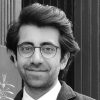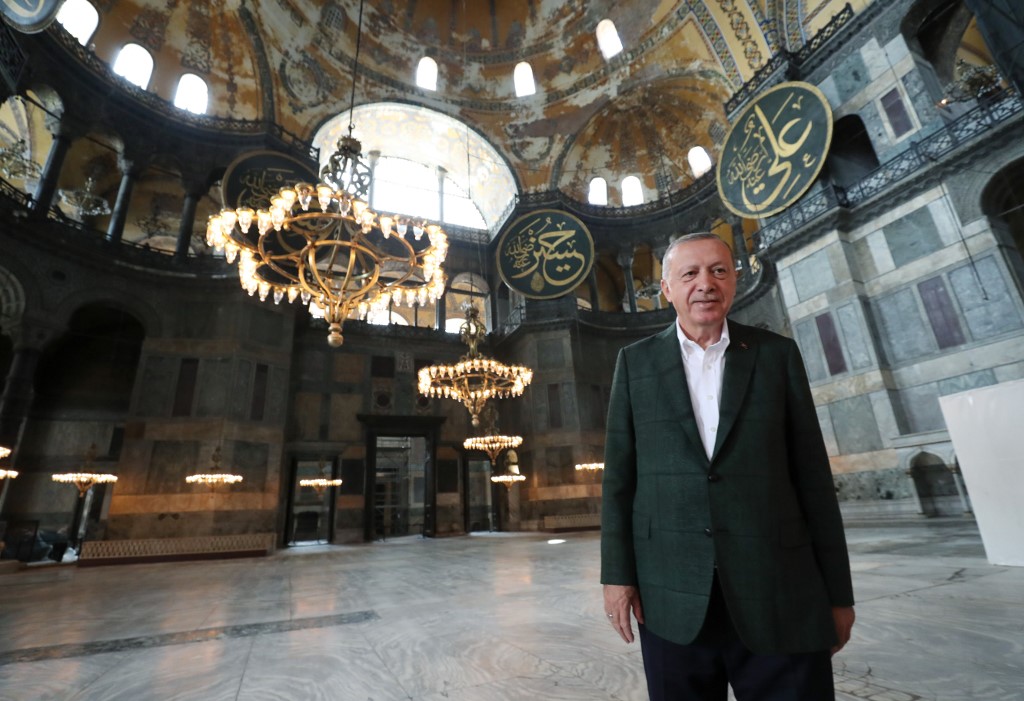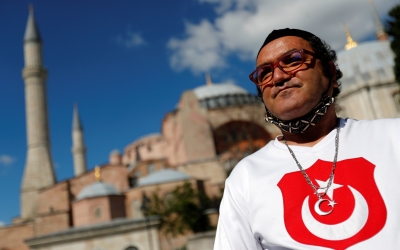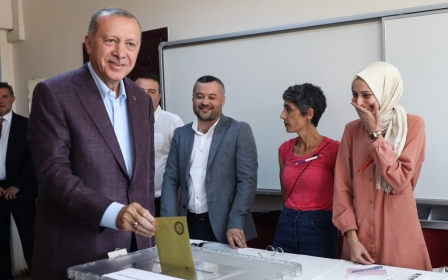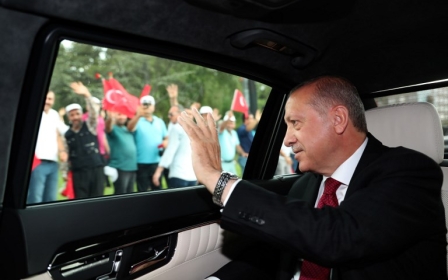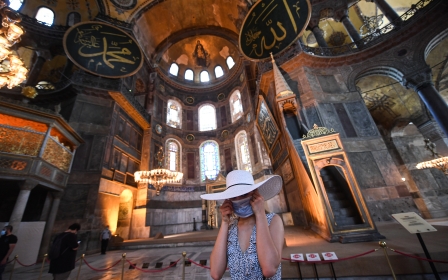Erdogan's 'New Turkey' narrative is no longer selling
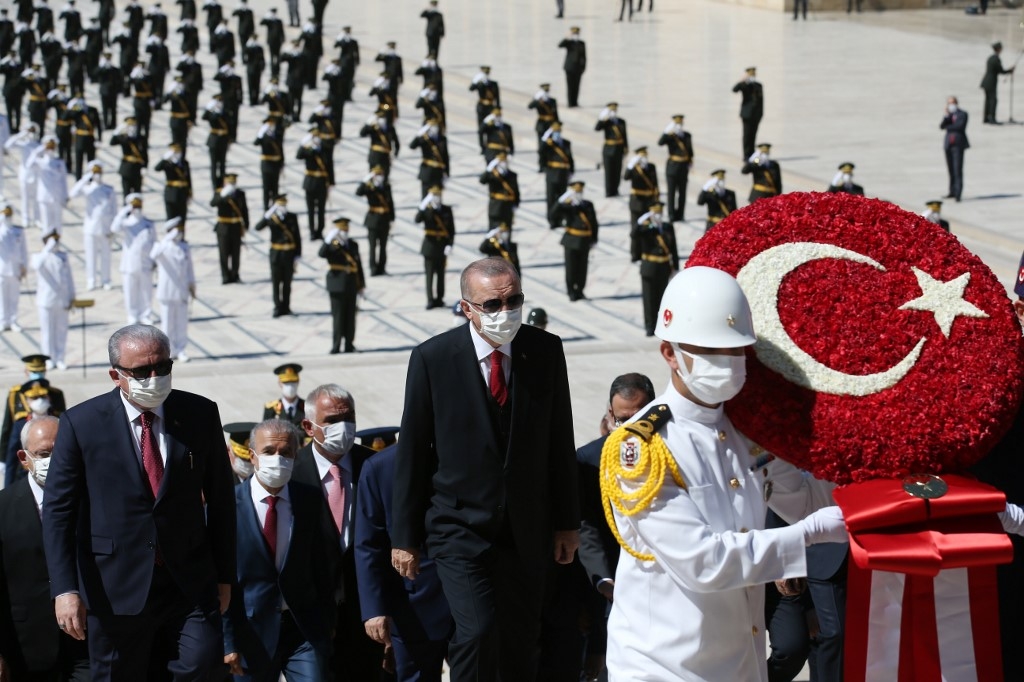
Turkish President Recep Tayyip Erdogan is trying to become a beacon of hope for Muslims worldwide. In the time of coronavirus, his populist Islamist symbolism has reached new heights.
Erdogan is considered to be one of the world’s populist leaders. US President Donald Trump’s “Make America great again”; Brazilian President Jair Bolsonaro’s “Brazil above everything, God above everyone”; Chinese President Xi Jinping’s “Chinese dream”; or Russian President Vladimir Putin’s “Strong president, strong Russia” are all short and simple slogans, representing their populist appeals to “the people”.
Erdogan’s “New Turkey”, meanwhile, has led to new and revanchist politics at home, aiming to replace Mustafa Kemal Ataturk’s secularism with an Islamist and nationalist agenda.
A 'new world'
The New Turkey vision is not actually new in Turkish politics. Former Islamist Prime Minister Necmettin Erbakan used a similar slogan, aiming to build “a liveable Turkey, a great Turkey once again, and a new world”. Erbakan’s “new world” was an alternative paradigm that involved concepts such as building a Muslim version of Nato, a framework akin to the EU and a common currency.
New MEE newsletter: Jerusalem Dispatch
Sign up to get the latest insights and analysis on Israel-Palestine, alongside Turkey Unpacked and other MEE newsletters
Changing the Hagia Sophia from a museum back into a mosque is the zenith of Erdogan's populist Islamist outreach to religious conservatives in the country
When Erdogan emphasises his own vision of a new Turkey, he is more or less on the same page as his former chief, with whom he differed politically in 2000 and broke away from to form the Justice and Development Party (AKP) a year later.
Today, Erdogan is embracing Islamism more than Erbakan did. Symbolically charged words such as “survival” or “native and national” lace his rhetoric, which aims to maintain unity within his constituency.
Notably, his communications style has changed since he introduced the new presidential system in 2018. The state’s communications directorate now wields unprecedented power.
Since Erdogan’s favourite style of communicating with huge masses at rallies and events is no longer feasible amid Covid-19, his team has been focusing on digital communications. Turkey’s engagement in the Eastern Mediterranean and discovery of natural gas in the Black Sea have been part of these communications.
Religious conservatism
In August, Erdogan’s communications office released a four-minute video featuring Islamist, nationalist, cultural and neo-Ottoman images, from aircraft depicting Turkey’s fight against Kurdish forces, to drilling ships, to the Green Dome in Medina where the Prophet Muhammad’s tomb is located, to al-Aqsa Mosque in Jerusalem. To the tune of upbeat music and slogans such as “God is great”, the video portrays Turkey as a defender of the oppressed, “from Gibraltar to Hejaz, from the Balkans to Asia”.
There are scenes from the Hagia Sophia, and of Erdogan citing verses from the Quran. The video features images of Alp Arslan, the second sultan of the Seljuk Empire; Sultan Mehmet II, the conqueror of Constantinople; and Erdogan. Pointedly, it does not feature Ataturk. The message is that Erdogan is the successor of the same ideological line, while Ataturk is “the other”, or in the language of the populists, “the elite”. The video was released six days before Victory Day, one of the most significant national holidays in the country.
Erdogan’s “New Turkey” is reinterpreting national holidays introduced in the one-party era. National Sovereignty and Children’s Day on 23 April, Youth and Sports Day on 19 May, and Victory Day on 30 August have been eclipsed by celebrations of the anniversaries of the 15 July coup attempt and the 29 May conquest of Istanbul.
While the pandemic was the excuse not to celebrate Victory Day in a broader fashion across the country, 350,000 people attended the reconversion of the Hagia Sophia into a mosque and its first Friday prayer ceremony in July.
Changing the Hagia Sophia from a museum back into a mosque is the zenith of Erdogan’s populist Islamist outreach to religious conservatives in the country. The move was influenced by the ongoing economic crisis, the Covid-19 pandemic, the influx of millions of refugees into Turkey and the emergence of two new right and centre-right parties (the Future Party and the Democracy and Progress Party) on the domestic political scene.
Emotional symbolism
While the new parties are only polling at a few percent each, Erdogan does not want to leave any room for error, as every vote is crucial after the 2019 local elections, where the AKP lost Istanbul and Ankara. The change of status for the Hagia Sophia aims to consolidate the conservative religious base and ensure the backing of ultra-nationalists.
Erdogan's government is, like other national populist administrations, engaged in a culture war. When Netflix was about to launch a new series in Turkey, Turkish officials requested that a gay character be removed. Netflix later cancelled the show.
Discussions with this type of emotional symbolism are not new in Turkey. Whenever Erdogan’s approval rating starts to decline, new communications tactics are always ready to bolster his image. As French political scientist Olivier Roy noted on the Hagia Sophia decision: “Erdogan could not Islamise minds, so he is trying to Islamise stones.”
Erdogan is now a part of the Hagia Sophia’s history, which once symbolised the magnificence of Christianity. One of his greatest desires is to leave a lasting legacy on Turkey, a motive reflected in the Hagia Sophia move and the building of a number of new mosques, including one at Taksim Square, the symbolic centre of the Gezi Park protests. This process abolishes the history - the soil and the dust - of this country.
Young Turks leaving
Historian Cemil Aydin has said that the late Ottoman ruler Abdul Hamid II’s pan-Islamist politics resulted in a “secular spiritual caliphate perception”. Similarly, the conservative majority is facing an identity crisis today. On the one hand, the legacy of Ataturk is being challenged by a nationalist-Islamist agenda; on the other, it is still used by the ruling elite to maintain legitimacy on the ground. That was the intention when a Victory Day drone show over the presidential complex displayed an image of Ataturk.
Turkey needs a new language, too - not merely for economic prosperity, but for its children and its future
Yet, while Erdogan emphasises Vision 2023, marking the 100th anniversary of the Turkish Republic, he also talks with great enthusiasm about Vision 2053, the 600th anniversary of Istanbul’s conquest, and Vision 2071, the 1,000th anniversary of the Battle of Manzikert and the beginning of the end of the Byzantine Empire in Anatolia and the start of the Turkification era.
But Generation Z is not buying this kind of showpiece politics. What they think, and their future goals, are another critical discussion, as three-quarters of young Turks are eager to leave the country to pursue better options.
When the author of The Location of Culture, Homi Bhabha, discusses human rights, he underlines that a new language is needed. Turkey needs a new language, too - not merely for economic prosperity, but for its children and its future. This new language must be far removed from revanchism and hysteria.
The views expressed in this article belong to the author and do not necessarily reflect the editorial policy of Middle East Eye.
This article is available in French on Middle East Eye French edition.
Middle East Eye delivers independent and unrivalled coverage and analysis of the Middle East, North Africa and beyond. To learn more about republishing this content and the associated fees, please fill out this form. More about MEE can be found here.


